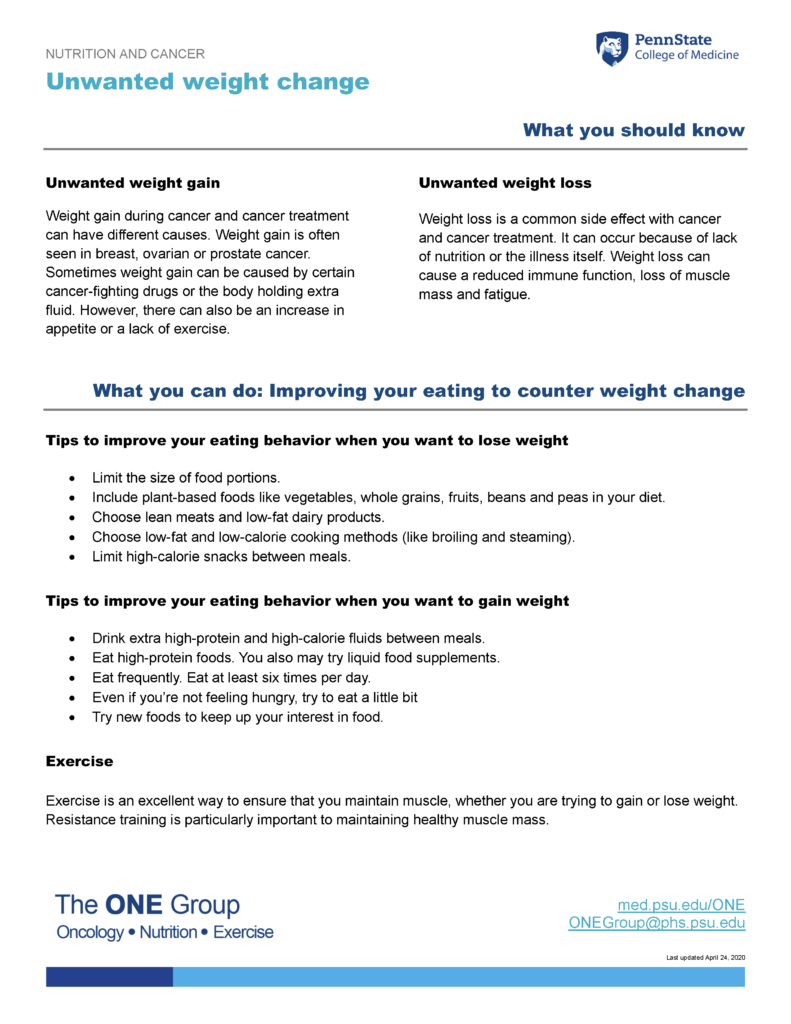Learn about unwanted weight change in people with cancer in this guide from The ONE Group (Oncology – Nutrition – Exercise) at Penn State College of Medicine.
Jump to topic
Search
What you should know
Unwanted weight gain
Weight gain during cancer and cancer treatment can have different causes.
Weight gain is often seen in breast, ovarian or prostate cancer.
Sometimes weight gain can be caused by certain cancer-fighting drugs or the body holding extra fluid.
However, there can also be an increase in appetite or a lack of exercise.
Unwanted weight loss
Weight loss is a common side effect with cancer and cancer treatment.
It can occur because of lack of nutrition or the illness itself.
Weight loss can cause a reduced immune function, loss of muscle mass and fatigue.
What you can do: Improving your eating to counter weight change
Tips to improve your eating behavior when you want to lose weight
- Limit the size of food portions.
- Include plant-based foods like vegetables, whole grains, fruits, beans and peas in your diet.
- Choose lean meats and low-fat dairy products.
- Choose low-fat and low-calorie cooking methods (like broiling and steaming).
- Limit high-calorie snacks between meals.
Tips to improve your eating behavior when you want to gain weight
- Drink extra high-protein and high-calorie fluids between meals.
- Eat high-protein foods. You also may try liquid food supplements.
- Eat frequently. Eat at least six times per day.
- Even if you’re not feeling hungry, try to eat a little bit.
- Try new foods to keep up your interest in food.
Exercise
Exercise is an excellent way to ensure that you maintain muscle, whether you are trying to gain or lose weight. Resistance training is particularly important to maintaining healthy muscle mass.
Other practical nutrition tips for weight change
- Read food labels to become more aware of portion sizes and calories.
- Weigh yourself every week.
- Talk with a registered dietitian for other ideas.
Foods to try
To lose weight: Drink water; eat vegetables, whole-grain products like bread and pasta, low-fat dairy products like skim or 1% milk, light yogurt and reduced-fat cheese.
To gain weight: Drink high-fat dairy products instead of water; eat protein-rich snacks like nuts, yogurt, peanut butter or eggs, and add butter, mayonnaise, sweets and other extras.
Foods to avoid
To lose weight: Limit the use of butter, mayonnaise, sweets and other extras. Limit the use of large portion sizes.
To gain weight: Limit non-fat dairy products like milk, yogurt and cheese.
Recipes
High-protein milkshake for weight gain
Ingredients:
1 cup protein-fortified milk
2 tbsp. butterscotch sauce, chocolate sauce or your favorite fruit syrup or sauce
½ cup ice cream
½ tsp. vanilla extract
Instructions:
Put all ingredients in a blender.
Blend at low speed for 10 seconds.
Frozen berry yogurt for weight loss
Ingredients:
250 g. frozen mixed berry
250 g. fat-free Greek yogurt (0% fat)
1 tbsp. honey
Instructions:
Blend berries, yogurt and honey until it comes together to a smooth ice-cream texture. Scoop into bowls and serve.
Where can I find more information about aerobic and strength-training exercises?
If you are interested in starting aerobic and/or strength-training exercises, The ONE Group (Oncology – Nutrition – Exercise) provides videos demonstrating proper form for more than 50 exercises.
Notes
Contact your physician if:
- You lose or gain more than five pounds in a week.
- You have a shortness of breath.
- You feel dizzy or become confused.
- You want to use related medication.
References
- Academy of Nutrition and Dietetics
- American Cancer Society
- American Institute for Cancer Research
- National Cancer Institute

